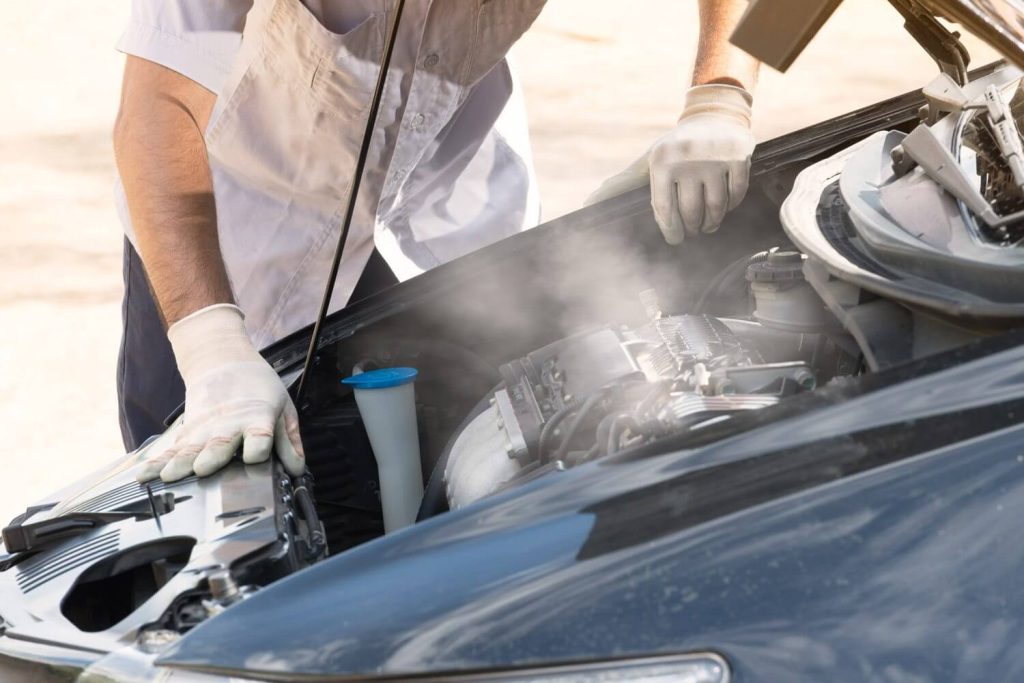Believe it or not, your car’s engine could overheat in the middle of winter. But, for obvious reasons, the scary sight of your temperature gauge ‘in the red’, and the unique smell of boiled-over coolant, will probably happen to you on a hot summer’s day.
Overheating isn’t a small problem. If you drive too long with an overheated engine, it could cause engine parts to seize, warp or score. Any of those problems will likely mean that the part or parts need be repaired or replaced. And if hot coolant boils over onto the body panels of your car, it could damage your paint finish.
That’s just the damage beyond whatever happened to your cooling system. And we still haven’t talked about the interruption to your day, or vacation, and the costs of the interruptions.
So you want to avoid an overheated engine. By learning more about why your engine overheats, you can take steps to keep everything running cool.
1. THERMOSTAT WON’T OPEN
Just like the thermostat in your house tells the AC it’s hot enough to start cooling the home, the thermostat in your car decides when the engine is hot enough to let coolant into it. The thermostat sits between the radiator and the engine. When things get hot, it opens up to let coolant get to the engine to maintain the right operating temperature. A defective thermostat will remain closed and block coolant from getting to the engine after it heats up, which means it’ll continue to heat up until it overheats.
2. BROKEN HOSE
Lower and upper hoses carry coolant to and from the radiator. They are subjected to extreme temperatures that can, over time, cause them to break down and crack. If you notice a new leak under your car, check the radiator hoses. The leak might be the beginning of a larger hole that will let out most of the coolant before it gets to the engine.
3. RADIATOR FAN DOESN’T TURN ON
The radiator fan helps pull more air through the radiator to help cool the coolant. The fan turns on when he engine reaches a certain temperature. If that automatic switch does not work, the fan won’t turn on and the coolant will stay hot leading to overheating. In older cars, the same thing happens when the fan belt breaks.
4. WATER PUMP NOT WORKING
The water pump makes sure that the coolant flows through the radiator at the correct rate. If the water pump stops working, the coolant will either flow through the radiator too slowly or not at all.
5. LOW OIL
While most people think of oil as a lubricant, it also helps to cool the engine. If you don’t keep your engine oil at the right levels, not only are you risking costly damage to cylinder linings and pistons, but you could also suffer an overheated engine.
6. HEAD GASKET LEAK
The head gasket sits between the engine block, which houses the main part of the cylinders, and the cylinder head which covers the cylinders to form the combustion chamber. The gaskets job is to expand and contract to make sure the fit between the block and the head remains sealed. If it doesn’t, it could mean that, similar to a leak in the hoses, coolant could be lost.
7. AIR IN THE COOLANT SYSTEM
While the coolant system is closed, air can get in over time. When enough air gets in and accumulates, the air pockets can restrict the flow of coolant or make the coolant look like it’s at the right levels, even though it isn’t. Both of these could lead to an overheated engine.
If you don’t want to be stuck on a highway in the middle of a sweltering day with your engine smoking like a volcano, then pay attention to the issues above and do everything you can to keep your engine cool.

